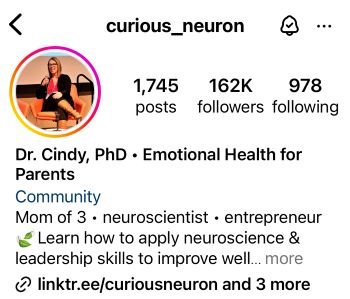10 Social Media Accounts Grandparents Should Follow
Some of the best social media accounts for grandparents are those aimed at parents. While grandparent-focused accounts can provide lots of useful information, it’s also helpful to see what parents are being bombarded with. By following the accounts that provide information to parents, we can keep up with what they are seeing.
So much has changed since we were parents. While (thankfully) we don’t need to know about everything that is out there, being aware of the changing landscape can make us more tolerant of what our adult children are doing as parents. Simply following along can make us better grandparents, because it helps us recognize how much parents are navigating.
What are the newest gadgets, both useful and absurd? What’s the latest research on screen time or fluoride or the power of nature? What are the emerging theories on feeding/sleeping/playing? Why are car seat recommendations so different now than they were 5,10, 20 years ago?
When we see the same information that our grandchild’s parents do, we don’t have to ask why they are doing something different from the way we did it. We can more easily step in with support if we already know the practices and philosophies they are following. Of course, following the same social media accounts doesn’t negate the need for finding out what help they need. It just means we are quicker to understand what they are asking.
The best Instagram accounts for grandparents
No matter which social media platform you spend time on, there are great parent-focused accounts to follow. The following Instagram accounts are ones we find incredibly useful; we’ve noted Facebook accounts where possible.
For all things safety related, @safebeginnings is a gold mine of information. (@safebeginningsfirstaid on Facebook). @safeintheseat is also excellent for information about car seat safety, and can be found on all other social media channels at the same user name.
@pedsdoctalk shares valuable content about pediatric health and more. She’s also on Facebook as @pedsdoctalk.
@likeasistersupport keeps us in the loop about the needs of new parents with research-based information on feeding and post-partum support. Find them on Facebook at the same user name.
@Parenting_fairly is a behavior consultant who explains the reasons behind a child’s behavior.
@familysleepinstitute (same user name on Facebook) offers diverse articles on current sleep strategies.
The content @growing.intuitive.eaters shares about helping children have a healthy relationship with food is entertaining and educational. Besides helping you relax about what your grandchildren do or don’t eat, it may make a difference in your own relationship with food.
@parentingtranslator shares scientific research on topics that impact parents, from motivating your child to clean up to what to do if your child bites.
@Curious_neuron provides information on applying neuroscience and leadership skills to the parent-child relationship. You can find the account with the user name @curiousneuron on Facebook.
@dr.siggie provides practical tools to help parents feel more empowered and less stressed. Also on Facebook at @dr.siggie.
How grandparents can share advice with parents
Following a wide range of informational accounts will enable you to be more supportive of parents. Just remember, you are trying to understand parents better, not educate them with what you learn. Depending on your relationship, you may be able to share an account or post without causing offense. Here are some ways to approach it if you want to share a post.
“I wish I’d known about this when I had my babies!”
“I thought this was fascinating!”
“There are some great tips in here—though I’m pretty sure you are doing most of them, if not all!”
When sharing an account, you can first see if parents are already following it. If they aren’t, you can say something like: “I stumbled across this account and it seems to have really great information. Thought I’d share!”
Be wary of misinformation, which is abundant on social media. Before sharing something from a source you haven’t checked out completely, do a little research. When I see something I’m unfamiliar with, like a claim that high fructose corn syrup is banned in other countries, I always try to learn more about it by verifying it with independent sources. (Turns out it’s not, it’s just labeled differently—thanks, @foodsciencebabe.)
Finally, make sure that you aren’t sharing things too often. Save it for when there is something really worthwhile, and use the opportunity to open up a conversation.
And of course, make sure you are following @morethangrand—just use the links below!




